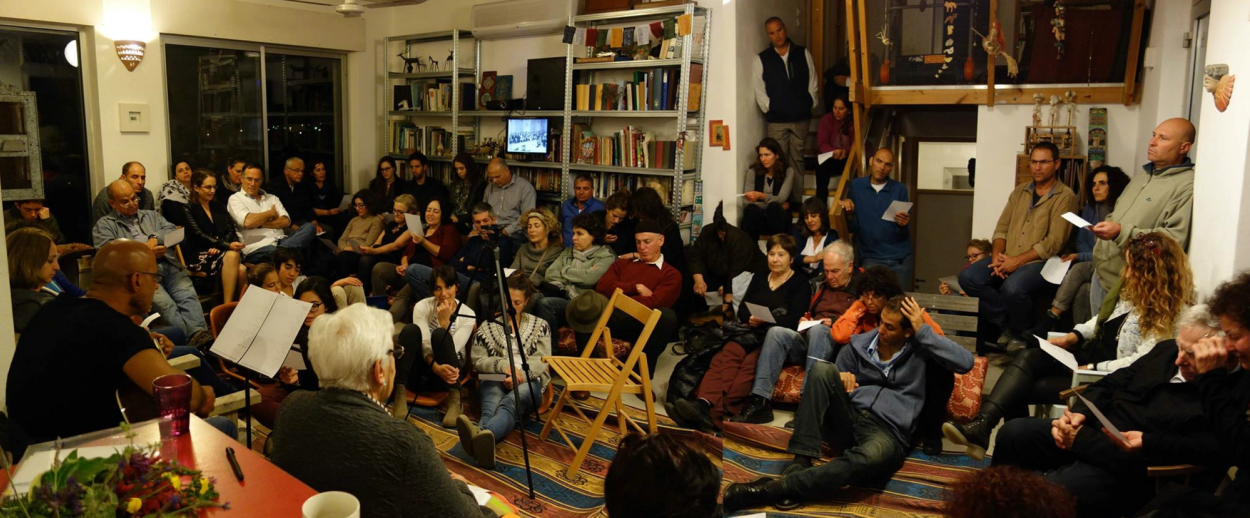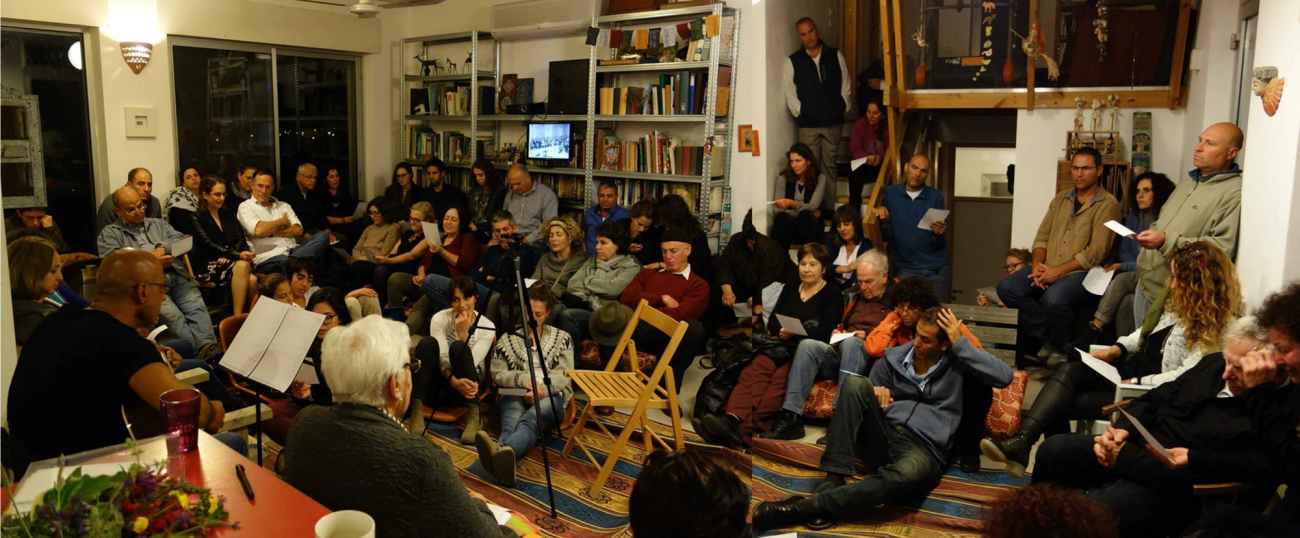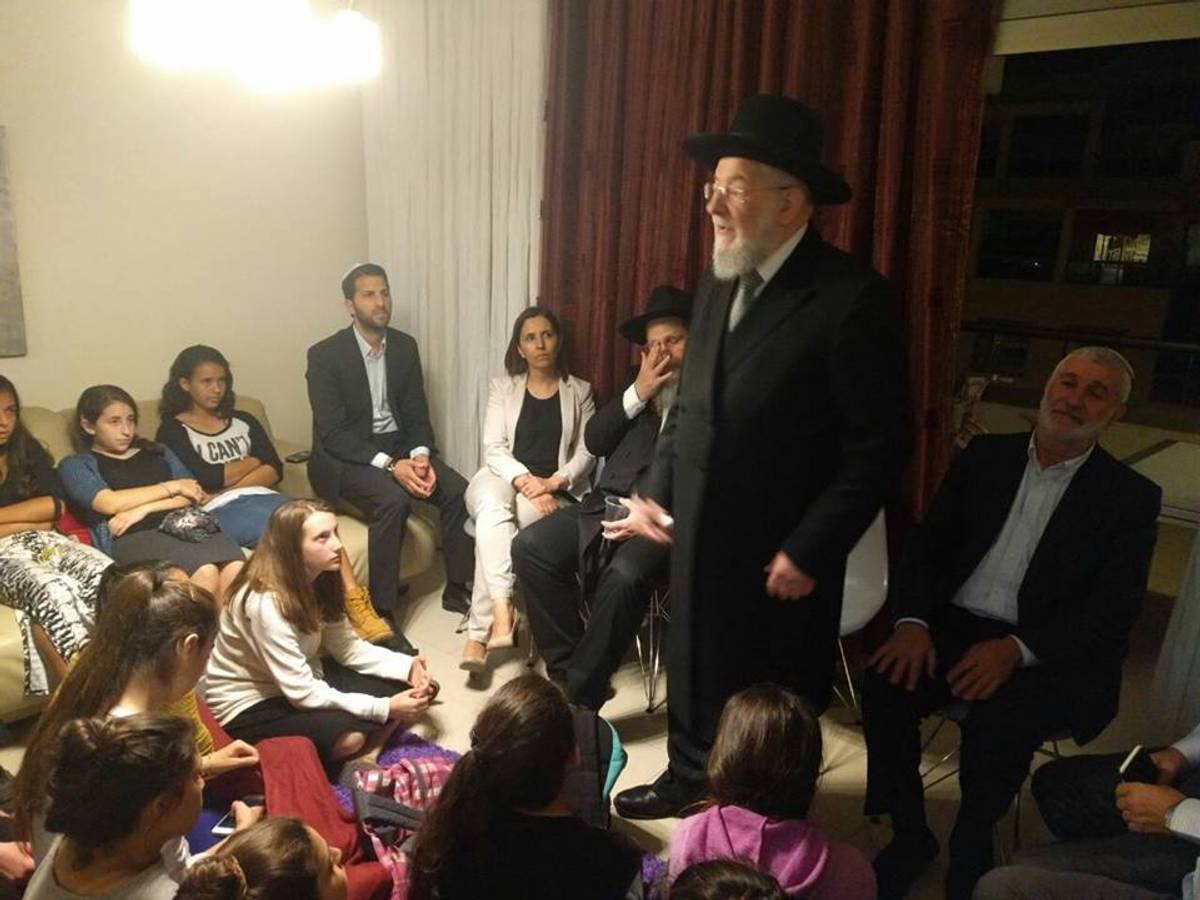Thousands Host Intimate Gatherings to Commemorate the Holocaust in Israel
The organization Zikaron Basalon helps facilitate tributes to the Shoah through song, testimony, and discussion




With its twin basalt murals and ornate tiled floor, the main hall of the Israeli president’s residence in Jerusalem—a home through which numerous prime ministers, popes, and other foreign dignitaries have walked—is not what one might call homey. This week, however, sofas were brought in, promoting a more laid back vibe and a comfortable place to listen.
On Tuesday, Israeli President Reuben Rivlin and his wife, Nechama, hosted a few dozen casually dressed guests, many of them in their twenties and thirties, for an event called Zikaron Basalon, meaning “Memory in the Living Room.” They gathered to hear Meir Ginosar, a survivor of the Auschwitz and Buchenwald death camps, tell his life story in honor of Yom HaShoah, Holocaust Remembrance Day.
The Zikaron Basalon event represents a departure from Rivlin’s typical schedule on Yom HaShoah, which will be packed with official state ceremonies at Yad Vashem and elsewhere; similar events with commemorative songs, imagery, and rhetoric will be held across the country in schools, town squares and army bases, as well. But Zikaron Basalon, the brainchild of Adi Altschuler, a social entrepreneur, who found the official ceremonies increasingly inaccessible, is intended to be very different.

In 2011, Altschuler invited some friends over to her living room for an alternative evening of remembrance. Over beers and Bamba, they listened to a Holocaust survivor named Chana Bergman tell her story. Someone whipped out a guitar, everybody sang along, and Altschuler and her friends discussed the Holocaust—its meaning and how best to remember it—long into the night.
In the following years, similar events were held in thousands of living rooms around the country. (The Zikaron Basalon website assists prospective hosts and participants match up, and provides a “host kit”; visitors to the webpage are asked,”How do you commemorate the Holocaust?”) And while the Presidential imprimatur granted by Rivlin can’t hurt, Zikaron Basalon was already on track to garnering an estimated 500,000 this year (up from 150,000 last year), with people gathering in remembrance at cafes, bars, prisons, psychiatric wards, shelters for the homeless, and centers for at-risk youth. (A handful of gatherings will be held in the United States.) Not every event includes a testimonial by a survivor; sometimes participants watch a recording, or tell the stories of their own parents and grandparents.
The evening at the President’s residence began, fittingly, with Rivlin meditating on the stuff of memory. “I was born nine days after the war broke out,” he said. “My family arrived in Eretz Yisrael 150 years before the Shoah. When the stories from the Shoah began to make their way to our homes, they were difficult to grasp. Collective memory without personal memory is opaque. You hear but you don’t understand. They spoke of six million, but none of us could understand what that meant until one by one, those brave survivors made it to the promised land, and began to tell their stories.”
Then, Meir Ginosar, a spry old man, began to tell his own story. Ginosar was born Meir Honigsberg in 1928 in the Polish town of Wierzbnik-Starachowice, located a couple of hours south of Warsaw. He spoke of the last time he saw his mother and four younger siblings, a memory that still haunts his dreams, and of how he managed to evade the murderous doctor Josef Mengele on three separate occasions. He took out his striped camp uniform from his backpack to show the president. He recounted standing on the roof of a camp building, watching as the Allied bombers struck factories just a few miles from the crematoriums.
After the war, Ginosar made his way to Palestine, where he joined the moshav Be’er Tuvia. There, he made up for his lost youth, riding his horse around the moshav and surrounding villages. But he could not shed a tear at funerals, he said. His experiences had left him detached and removed. In 1947 he joined the Palmach, where he would volunteer for the most dangerous missions he could find. During the conquest of the Arab town Lod, Ginosar watched as throngs of civilians left their homes with small parcels on their backs. A man crouched next to him, picked up Ginosar’s foot and kissed the sole of his shoe. “I had been human dust, and now a man was kissing my foot,” he said. “That’s when compassion came back to me.”
President Rivlin asked Ginosar if his children had heard his stories. “I was silent for 70 years,” Ginosar explained. “But my wife pressured me to tell my story, so I began sharing.” Stories such as Ginosar’s were painfully missing from so many living rooms in Israel and around the world for many decades after the Holocaust. Now, at the eleventh hour, those stories are being told, and heard, in the Israeli president’s home, and in thousands of others.
Tal Kra-Oz is a writer based in Tel Aviv.